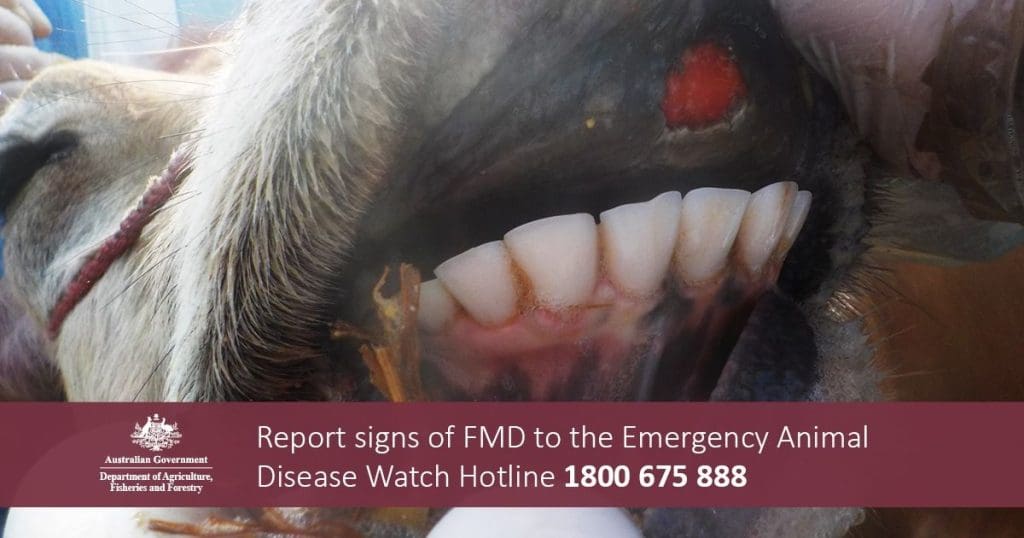
VICTORIA has addressed concerns about the livestock compensation process if a Foot and Mouth Disease outbreak and stock standstill occurs.
Agriculture Victoria has updated its website to more accurately describe how compensation will be paid in the event of an FMD detection.
Based on Victorian legislation passed in 1994, in the event of an FMD detection, compensation for animals will be set at pre-FMD outbreak values as if they were disease-free and for products, fodder and equipment it will be based on value immediately prior to destruction.
At the recent annual Rural Marketing Agents annual conference, independent analyst Simon Quilty drew attention to the Australian Emergency Animal Disease Response Agreement and AUSVETPLAN compensation methodology.
In a herd or flock where the disease was found, under the agreement, the value of animals would be determined by the prices at the two most recent sales that had taken place at the closest saleyards to the affected property.
But under an FMD crisis, the impact is a rolling problem, Mr Quilty said.
“In a week’s time, the livestock sales continue, but the market is shut off, and prices plummet.
“In a herd that contracts FMD a week later, their compensation is determined by the local saleyards prices that week,” he said.
“If in three weeks’ time the market has crashed 50pc, the same happens again – it’s a rolling compensation.
“Effectively, producers are going to wear the cost of market closures, so you do not want to be the last to contract FMD in your herd – you’d better be the first, because only the first will get pre-FMD prices for compensation,” he said.
“At the other end, the last guy whose suffers a herd infection gets the worst prices ever.
“It’s wrong,” Mr Quilty said.
“It should not be that way, and represents policy poorly written.
“In my opinion, compensation should be based on a set time period prior to any FMD outbreak – not some ‘rolling average’ of prices once the disease strikes.”
Compensation paid at pre-FMD prices
This month, Mr Quilty was notified by Agriculture Victoria of website updates that articulated more clearly how compensation would be based on pre-FMD outbreak prices.
“Prior to this it seems my interpretation of AUSVET PLAN was the accepted compensation process for most states.
“This sets now an important precedent for other states,” he said.
According to an updated page on the Agriculture Victoria website: For livestock, compensation is set at the market value of stock on the date of detection or reporting of disease on the property, or on the date restrictions on the movement of livestock are imposed, whichever is the earlier.
If FMD is detected anywhere in Australia, authorities will immediately implement a nation-wide livestock standstill prohibiting the movement of any susceptible livestock for at least 72 hours.
For property (such as livestock products, fittings, fodder, equipment or vehicles), compensation is assessed as the value of the property immediately prior to destruction.
The value of animals is determined as if they were disease free. It will take into account the animals’ age, sex, breed, body condition, live-weight, production records and other factors relevant to their class.
Consistent, standard, valuations will generally be used for non-stud and non-elite classes of stock. If agreement cannot be reached between the owner of the livestock and the authorities, then the value of the animals will be determined by a person who has experience in the arbitration of disputes who is nominated by the Minister.
With the approval of the Secretary, an additional amount of compensation may be payable if the market value of the livestock has increased by the time movement restrictions are lifted.
An owner of livestock does not need to have a pre-determined inventory or an existing valuation of livestock to be eligible for compensation. A pre-determined inventory and valuation of livestock and product may assist authorities in the valuation process but will not necessarily be a determinant of final values and does not determine eligibility for compensation.
Compensation arrangements are fully described in Part 5, Division 1 – Exotic Diseases Compensation, and in particular sections 62, 63, 64, and 90 of the Livestock Disease Control Act (1994).
Hope that other states will follow Victoria’s lead
Mr Quilty said the hope is that the other states will follow Victoria’s lead on FMD compensation.
“I really welcome the decision by the Victorian Government and believe and hope that all other states should follow suit, keeping in mind that the AUSVETPLAN is a guide only and that ultimately it is the states that decide on compensation.
“We look to Victoria as a lead or guide and hope the other states will follow.”
A Department of Agriculture Forestry and Fisheries spokesperson said compensation provisions are already in place under the EADRA in relation to direct costs arising from a nationally agreed eradication effort.
“Individual states and territories may also have compensation arrangements in place.
“These are determined by those individual states and territories and do not impact compensation agreed under EADRA arrangements.”

HAVE YOUR SAY